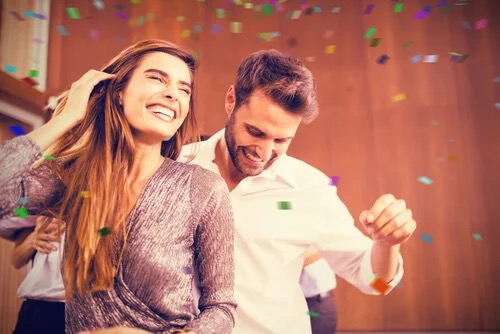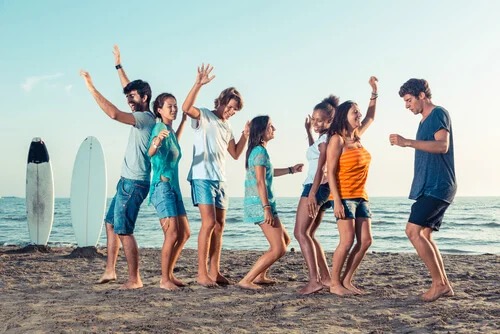Music Strengthens Personal Relationships

Music plays a key role in many societies and cultures. In fact, since time immemorial, music has played a major part in all kinds of ceremonies. In short, we see music as a way by which humans express themselves. Furthermore, we know that music strengthens personal relationships.
It could be said that music has also played an essential part in our evolutionary history. Indeed, Darwin suggested that music evolved as a way to attract the opposite sex. Therefore, perhaps music’s enduring importance is down to the fact that it does indeed tend to strengthen personal relationships.
How music strengthens personal relationships
There are many reasons why music strengthens personal relationships. You’re sharing an interest, you have a common goal, and you experience positive feelings due to undertaking a shared activity. In fact, these reasons aren’t exclusive to the world of music.
More specifically, with music, you’re sharing a rhythm. This promotes the synchronization between you and others. However, numerous studies suggest that the key to this synchronization is in the joint secretion of hormones. Indeed, this could certainly explain one way in which music strengthens personal relationships.

Music strengthens personal relationships via synchronization
When you dance, sing, or play musical instruments, you synchronize with other people. The effect of this synchronization on your personal ties seems to be based on the relationship between mimicry and rapport.
Doing the same dance step or singing the same songs increases rapport. This rapport then increases the chance of you repeating the same actions. Hence, a kind of positive loop’s created, in which you become closer to the other people involved. Furthermore, seeing the actions of others leads to the activation of certain neural networks in your brain. They’re called mirror neurons, and they’re fired when you see another person doing the same thing as you.
It’s possible that doing the same activity as someone else, along with the activation of these neural networks, means it’s harder for you to notice differences between yourself and the other person. This creates a link between you.
“Music is the social act of communication among people, a gesture of friendship, the strongest there is.”
-Malcolm Arnold-
Music and hormones
We know that music produces an increase in dopamine, serotonin, and oxytocin. Oxytocin’s a neuropeptide that’s also released in breast-feeding, sexual contact, and sports. We associate its production with an increase in confidence, empathy, generosity, and eye contact. It also improves your recognition of faces, thus improving your relationships.
As an example, a study conducted in 2015 compared a group that had to sing an impromptu song with another group that had to sing a rehearsed song. The study found that, although all oxytocin levels grew after singing, the effect was greater in the improvisation group. The study concluded that social fluency was increased among the improvisation group because they needed synchronization to improvise.

Music and endorphins
The role of oxytocin’s been studied a lot in relation to music. However, endorphins could also be important. You secrete these peptides during synchronized activities or exercise. In addition, they’re central to the regulation of your reward system, your social motivation, and your perception of pleasant sensations. Therefore, when you release a lot of endorphins, your feelings of positivity increase.
The “good vibe” produced by endorphins means you see everything at that point in a positive and meaningful way. Hence, you see your interactions more positively, strengthening those bonds.
Think of the characteristics of music. It makes you move, keep to the rhythm, sing, and dance. It’s rather like the coming together of an orchestra. Because it’s the combination of all the elements that bring you closer to others. It’s little wonder that music also relaxes you, amuses you, and gives you unforgettable experiences that you can share with others around you.
Music plays a key role in many societies and cultures. In fact, since time immemorial, music has played a major part in all kinds of ceremonies. In short, we see music as a way by which humans express themselves. Furthermore, we know that music strengthens personal relationships.
It could be said that music has also played an essential part in our evolutionary history. Indeed, Darwin suggested that music evolved as a way to attract the opposite sex. Therefore, perhaps music’s enduring importance is down to the fact that it does indeed tend to strengthen personal relationships.
How music strengthens personal relationships
There are many reasons why music strengthens personal relationships. You’re sharing an interest, you have a common goal, and you experience positive feelings due to undertaking a shared activity. In fact, these reasons aren’t exclusive to the world of music.
More specifically, with music, you’re sharing a rhythm. This promotes the synchronization between you and others. However, numerous studies suggest that the key to this synchronization is in the joint secretion of hormones. Indeed, this could certainly explain one way in which music strengthens personal relationships.

Music strengthens personal relationships via synchronization
When you dance, sing, or play musical instruments, you synchronize with other people. The effect of this synchronization on your personal ties seems to be based on the relationship between mimicry and rapport.
Doing the same dance step or singing the same songs increases rapport. This rapport then increases the chance of you repeating the same actions. Hence, a kind of positive loop’s created, in which you become closer to the other people involved. Furthermore, seeing the actions of others leads to the activation of certain neural networks in your brain. They’re called mirror neurons, and they’re fired when you see another person doing the same thing as you.
It’s possible that doing the same activity as someone else, along with the activation of these neural networks, means it’s harder for you to notice differences between yourself and the other person. This creates a link between you.
“Music is the social act of communication among people, a gesture of friendship, the strongest there is.”
-Malcolm Arnold-
Music and hormones
We know that music produces an increase in dopamine, serotonin, and oxytocin. Oxytocin’s a neuropeptide that’s also released in breast-feeding, sexual contact, and sports. We associate its production with an increase in confidence, empathy, generosity, and eye contact. It also improves your recognition of faces, thus improving your relationships.
As an example, a study conducted in 2015 compared a group that had to sing an impromptu song with another group that had to sing a rehearsed song. The study found that, although all oxytocin levels grew after singing, the effect was greater in the improvisation group. The study concluded that social fluency was increased among the improvisation group because they needed synchronization to improvise.

Music and endorphins
The role of oxytocin’s been studied a lot in relation to music. However, endorphins could also be important. You secrete these peptides during synchronized activities or exercise. In addition, they’re central to the regulation of your reward system, your social motivation, and your perception of pleasant sensations. Therefore, when you release a lot of endorphins, your feelings of positivity increase.
The “good vibe” produced by endorphins means you see everything at that point in a positive and meaningful way. Hence, you see your interactions more positively, strengthening those bonds.
Think of the characteristics of music. It makes you move, keep to the rhythm, sing, and dance. It’s rather like the coming together of an orchestra. Because it’s the combination of all the elements that bring you closer to others. It’s little wonder that music also relaxes you, amuses you, and gives you unforgettable experiences that you can share with others around you.
All cited sources were thoroughly reviewed by our team to ensure their quality, reliability, currency, and validity. The bibliography of this article was considered reliable and of academic or scientific accuracy.
- Tarr, B., Launay, J. y Dunbar, R.I.M. (2014). Music and social bonding: “self-other” merging and neurohormonal mechanisms. Frontiers in Psychology, 5:1096.
This text is provided for informational purposes only and does not replace consultation with a professional. If in doubt, consult your specialist.







